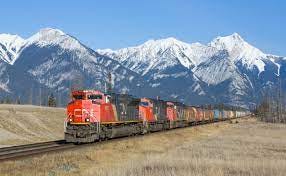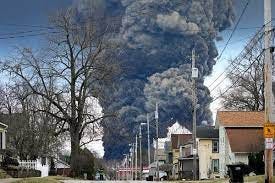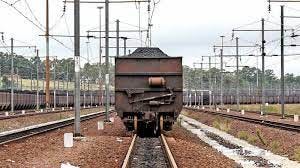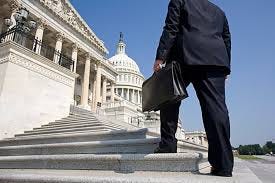Why the East Palestine Debacle Matters
Government of the Donors, by the Donors and for the Donors
Welcome to the Civic Way journal, our quick take on the relevance of current events to America’s future governance. The author, Bob Melville, is the founder of Civic Way, a nonprofit dedicated to good government, and a management consultant with over 45 years of experience improving public agencies.
Introduction
In Civic Way’s last post, an essay from Mike Koetting, last year’s averted rail strike was framed as an opportunity. A chance to step back and ask why American government seems so dysfunctional. The recent freight train derailment in East Palestine Ohio offers a similar vantage point.
The East Palestine debacle is, more than anything else, a tragedy. For the 4,700 residents of that small community on the Ohio-Pennsylvania. For the local air, water and soil, and the living things that share those resources. Perhaps even for the 25 million who inhabit the Ohio River Basin.
We hope that Norfolk Southern, federal agencies, state and local governments and other entities will do everything in their power to restore the lives of those impacted, and the environment in which they live. But those of us living elsewhere must do more than that. We must ask hard questions about what happened there, why it happened and how the event should matter to all of us.
The East Palestine accident won’t be the last train derailment. And it won’t be the last calamity that befalls Americans. But learning the lessons of East Palestine could prevent many similar tragedies from occurring in our own communities.
The Freight Rail Industry
The US railroad industry is a vital part of the US economy. The entire country depends on well-managed, efficient freight rail service. Without it, our goods would be a whole lot scarcer and more costly. We all benefit in some way from a healthy, responsible freight rail industry (as well as its primary competitor, the trucking industry).
The US rail industry, which has the world’s largest rail transport network (160,000 miles), is dominated by five “Class I” railroads. These big corporations—Union Pacific, Burlington Northern and Santa Fe, CSX, Norfolk Southern and Kansas City Southern[i]—emerged from a series of late 20th Century mergers. And these corporations have been thriving. Norfolk Southern, for example, recorded a $4.8 billion profit last year (about 70 percent of which it spent on stock buybacks).
In many ways, freight rail is like a lot of other American industries. An employer of thousands of our friends and neighbors. A distributor of thousands of vital goods and materials. Indispensable to our economy, communities and everyday lives. We need the industry to prosper economically, but not at the expense of their workers, our environment or the public at large.
The Heartbreak of East Palestine
On February 3rd, five cars of a 151-car, 9,300 foot-long and 18,000-ton Norfolk Southern freight train carrying hazardous vinyl chloride derailed in East Palestine. The accident occurred mere moments after the train’s crew detected an overheated wheel bearing[ii].
Toxic chemicals leaked into the nearby soil and water. A frightening black cloud rose from the wreckage. The railroad executed a controlled release of fumes into the air to prevent a larger explosion. Residents were temporarily forced to flee their homes, and later reported stinging throats and eyes (and sick pets). Some feared the Ohio River’s downstream contamination.
The Ohio Attorney General filed a 58-count lawsuit charging Norfolk Southern with negligence and recklessness. Among other things, Ohio is seeking reimbursement from Norfolk Southern for costs it has incurred. It also is demanding certain mitigation measures like responsible contaminant disposal and groundwater monitoring. At least 20 other lawsuits have been filed by impacted residents and businesses.
Understanding What Happened—And What Did Not
We should understand what failed the people of East Palestine and, by extension, the American people. And, like with so many other issues, we should start by dismissing the politically charged distractions that follow on the heels of every American disaster.
We have already heard the predictable slights and slurs. The Department of Transportation (DOT) is responsible. The Secretary of Transportation, Pete Buttigieg, should have done more. President Biden doesn’t care about East Palestine or rural whites. The workers care more about their benefits than the communities they traverse. Corporations and railroad executives always put profits above people. Former President Trump gutted Obama-era regulations that would have prevented the derailment.
Such claims, even when they contain a grain of truth, are one-dimensional. They offer feigned outrage for genuine concern. Finger-pointing instead of accountability. Posturing in lieu of remedies. They tell us little about the problem and even less about the solution. In short, they are not helpful.
Let’s begin with some data. According to the DOT’s Bureau of Transportation Statistics, total derailments have fallen from 2,234 in 2001 to 1,087 in 2021. While the overall derailment rate per freight miles has risen somewhat over the last decade[iii], the Association of American Railroads, the industry’s top lobbyist, claims that the hazmat accident rate has declined 55 percent during the same period.
The real problem? Even if we are getting better at preventing derailments, freight trains still derail. Worse, the consequences of derailments can be devastating, especially when they involve hazardous materials (hazmats). As the airline industry knows all too well, one accident is one too many.
The Real Culprit in East Palestine
The problem underlying the East Palestine accident is the same problem facing most American industries. Indeed, virtually all industries operating in a capitalistic economic system. That is, the daily struggle to reconcile an enterprise’s interests with those of the public. The ongoing balancing act between the corporate mission and common good.
In recent years, the freight rail industry has lost its equilibrium. The federal regulatory process has failed us. Vigorous regulatory oversight has receded. The industry has slashed workers, delayed repairs, and used technology to ship more freight with fewer workers and lower costs. If we had been paying attention, we would learned that boosting profits and indulging investors too often outweigh the public interest.
Freight railroads have a lot of clout in Congress and state legislatures. Railroads spend millions to kill or water down new federal safety standards and exploit loopholes. According to Open Secrets, over the last 20 years, the Association of American Railroads and four largest US railroads together spent over $480 million on federal lobbying. This, in and of itself, is not the problem. Corporate lobbying can provide important insights to our elected officials as they set public policies.
The problem is that, without balance—without adequate input from other voices—it is easier for politicians to listen to industry concerns more than the common good. To kill, weaken or delay new safety regulations. To delay the implementation of new braking systems[iv]. To operate old, understaffed and lengthy trains on deteriorating tracks. To keep fines so low they become a routine business cost[v].
Our elected officials should be attuned to the industry’s competitive pressures and stockholder demands. But they must strike a balance—or at least try to strike a balance—between such factors and public safety and environmental considerations.
A Balanced Approach to Fixing the Problem
What if we rediscovered the common good? What if we gave equal weight to public interests in assessing problems and crafting solutions? What if we built a federal regulatory system that effectively reconciled industry needs with public interests? That helped companies attain profitability without hurting people?
Our path forward would likely include measures such as the following:
Define and mark Hazmat trains as trains with at least one rail car carrying toxic substances
Reduce the maximum Hazmat train length to 1.5 miles and speed limit to 40 miles per hour
Require railroads to provide timely public notice of planned Hazmat routes and actual incidents
Empower the National Transportation Safety Board to fully enforce safety regulations, conduct rigorous inspections and levy credible sanctions, penalties and fines
Improve working conditions for railroad workers, develop appropriate industry staffing standards and regularly obtain worker input on safety issues
Accelerate train car (including Hazmat tank cars) and braking system upgrades
Improve wayside detection technology and install more rail heat detectors
Improve and expand the freight train early-warning sensor network
Every measure should be vetted and debated by an ad hoc group of industry experts and stakeholders, including representatives of every constituency and the public at large. Our elected officials should encourage the group to forge a consensus around the recommendations. And the government and railroads should jointly fund the work (the railroads might consider using part of their lobbying budget).
The Lessons of East Palestine
It is no easy matter to run a business. Errors will be made. But in weighing the private and public interests, our system must help ensure that such errors favor the public interest. And, in a capitalistic economy, especially sectors with limited competition, we will always need an independent arbiter to make sure that happens.
Balance requires good government and fair regulations. Ensuring public safety for any industry—airlines, pharmaceuticals, trucking or rail—requires complex rules, solid expertise and responsive government. Efficient regulations pose extra costs on corporations (probably no more so than the costs of strong competition), but they can help society avoid the heavy price of the incidents they’re designed to prevent.
Government is broken, usually more so for citizens than political donors. But, as East Palestine demonstrates, good government—one that effectively balances competing interests on behalf of the common good—is needed now more than ever. We need a government at all levels that listens to all sides, but ultimately puts people and the common good above all else.







